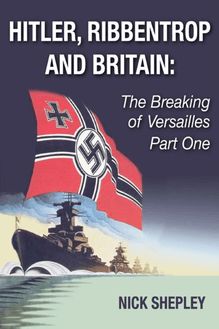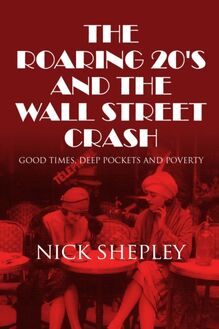-
 Univers
Univers
-
 Ebooks
Ebooks
-
 Livres audio
Livres audio
-
 Presse
Presse
-
 Podcasts
Podcasts
-
 BD
BD
-
 Documents
Documents
-
- Cours
- Révisions
- Ressources pédagogiques
- Sciences de l’éducation
- Manuels scolaires
- Langues
- Travaux de classe
- Annales de BEP
- Etudes supérieures
- Maternelle et primaire
- Fiches de lecture
- Orientation scolaire
- Méthodologie
- Corrigés de devoir
- Annales d’examens et concours
- Annales du bac
- Annales du brevet
- Rapports de stage
La lecture à portée de main
Vous pourrez modifier la taille du texte de cet ouvrage
Découvre YouScribe en t'inscrivant gratuitement
Je m'inscrisDécouvre YouScribe en t'inscrivant gratuitement
Je m'inscrisEn savoir plus
Vous pourrez modifier la taille du texte de cet ouvrage
En savoir plus

Description
Informations
| Publié par | Andrews UK |
| Date de parution | 07 décembre 2015 |
| Nombre de lectures | 0 |
| EAN13 | 9781783330850 |
| Langue | English |
Informations légales : prix de location à la page 0,0150€. Cette information est donnée uniquement à titre indicatif conformément à la législation en vigueur.
Extrait
Title Page
RUSSIA’S STRUGGLE WITH MODERNITY 1815-1929
20th Century Russia Part One
by
Nick Shepley
Publisher Information
Published in 2013 by
Andrews UK Limited
www.andrewsuk.com
The right of Nick Shepley to be identified as the Author of this Work has been asserted by him in accordance with the Copyright, Designs and Patents Act 1998
Copyright © 2013 Nick Shepley
All rights reserved. No part of this publication may be reproduced, stored in a retrieval system, or transmitted, in any form or by any means without the prior written permission of the publisher, nor be otherwise circulated in any form of binding or cover other than that in which it is published and without a similar condition being imposed on the subsequent purchaser. Any person who does so may be liable to criminal prosecution and civil claims for damages.
Preface
In 1931 Joseph Stalin gave an edict to the Communist Party and the Soviet bureaucracy that was to have profound consequences for every man, woman and child in the Soviet Union. It was so important that it would later decide much of the outcome of World War Two. It was an order to industrialise Russia on a scale, and at a pace that had never before been seen in human history. It was an order that would have human consequences and entail human suffering on an equally unparalleled scale. Stalin’s Orders To the Economic Executives was steeped in the lessons of Russia’s often tragic past. It reminded members of the Communist Party what the price had been in the past for those rulers who had ignored the importance of modernising Russia:
“To slacken the tempo would mean falling behind. And those who fall behind get beaten. But we do not want to be beaten. No, we refuse to be beaten! One feature of the history of old Russia was the continual beatings she suffered because of her backwardness. She was beaten by the Mongol khans. She was beaten by the Turkish beys. She was beaten by the Swedish feudal lords. She was beaten by the Polish and Lithuanian gentry. She was beaten by the British and French capitalists. She was beaten by the Japanese barons. All beat her -- because of her backwardness, because of her military backwardness, cultural backwardness, political backwardness, industrial backwardness, agricultural backwardness. They beat her because it was profitable and could be done with impunity. You remember the words of the pre-revolutionary poet: “You are poor and abundant, mighty and impotent, Mother Russia.” Those gentlemen were quite familiar with the verses of the old poet. They beat her, saying: “You are abundant,” so one can enrich oneself at your expense. They beat her, saying: “You are poor and impotent,” so you can be beaten and plundered with impunity. Such is the law of the exploiters -- to beat the backward and the weak. It is the jungle law of capitalism. You are backward, you are weak -- therefore you are wrong; hence you can be beaten and enslaved. You are mighty -- therefore you are right; hence we must be wary of you.
That is why we must no longer lag behind.
In the past we had no fatherland, nor could we have had one. But now that we have overthrown capitalism and power is in our hands, in the hands of the people, we have a fatherland, and we will uphold its independence. Do you want our socialist fatherland to be beaten and to lose its independence? If you do not want this, you must put an end to its backwardness in the shortest possible time and develop a genuine Bolshevik tempo in building up its socialist economy. There is no other way. That is why Lenin said on the eve of the October Revolution-”Either perish, or overtake and outstrip the advanced capitalist countries.”
We are 50 or 100 years behind the advanced countries. We must make good this distance in 10 years. Either we do it, or we shall go under.
That is what our obligations to the workers and peasants of the U.S.S.R. dictate to us.”
In this, the first of two ebooks, we will first look deep into Russia’s past to see how her Czars effectively resisted political and economic modernisation in the 19th Century. Hopefully, this should show us how they built up the systemic crisis that led to Czardom’s collapse in1917. We will examine how the formative years of the Bolshevik and later the Communist Party forged the ideological vision that would bring these massive changes about. We’ll also look at the lives and ideas of both Lenin and Stalin in relation to the almost impossible task of modernising Russia, and we will examine the scale, and the human costs of this epic undertaking. In the second volume we will examine the industrial society that Stalin created, its people, culture, is slavery and its near destruction in 1941. We will also see how its war industries saved the USSR and made her a world power to be reckoned with.
The Fear Of Modernity
If we want to fully understand the scale of the task that faced the Communist State after the Russian Civil War then we really have to step back into the 19 th Century to examine why Russia, unlike the rest of Western Europe failed to industrialise. It was the last Czar, Nicholas II’s contention that most of Russia’s contemporary problems could actually be attributed to her greatest westerniser greatest moderniser, Peter the Great. Nicholas II disliked St Petersburg, Peter’s modern European city, modelled on the Neo-Classicist architecture that was prevalent in Paris, Berlin, Vienna and Madrid. This architecture was steeped in European thinking, in the Renaissance and the Enlightenment, in scientific revolutions, radical new thought on the scope and the role of government. These new ideas questioned the nature of the individual and his or her potential, and worst of all in Nicholas’s view, it challenged religion as a superstition.
The Enlightenment, a century and a half of radical new ideas that started with the likes of Isaac Newton and Francis Bacon, swept away old superstitious ideas about the nature of the universe and established much of modern scientific thinking. The implications of this on economics, politics philosophy and culture led in no small part to the French Revolution. The sweeping away a bankrupt state in its entirety, by men armed with modern ideas had been resolutely resisted by most Czars that followed Peter.
Peter the Great, who ruled nearly a century before the revolution, had no interest in diminishing his power with anything as naive as liberal democracy, but he did take on board one new innovation from the West; modern bureaucracy and a restructuring of the army on European lines. Peter died just before the dawn of the 18 th Century, but lived through a time where in Europe nations like England and Holland were becoming major maritime powers, establishing financial innovations such a national debts in order to punch well above their weight on a global level. Christopher Wren remodelled London as a modern planned stone built city, using the latest scientific architectural innovations and in the aftermath of the 30 years war the continent was awash with state of the art military know how. Peter was the first Czar to set foot out of Muscovy and saw the new Europe with his own eyes and was instantly taken with it, he knew where the future lay.
It was Nicholas II’s contention that when Peter the Great decided to create a modern civil service, he created an almost blasphemous barrier between the divinely appointed Czar and the ordinary Russians who were in Nicholas’s eyes the children of the Czar. What Peter established was an new and original, if schismatic direction in Russian society, known loosely as the ‘Petrine Tradition’, it was western looking, modern and assured of the notion that Europe held the answers. During Peter’s reign a steady stream of foreign experts in all fields came to Russia to assist in the Czar’s designs.
It is worth acknowledging at this point a few of the many shortcomings of Nicholas, and why exactly he was so adamant in his criticism. Nicholas II embraced a wholly different tradition in Russian discourse, one that commentators have described as being ‘Muscovite’.
Nicholas, who ruled from 1894 to 1917 moved his royal court to Moscow, capital of the ancient medieval kingdom of Muscovy. In doing this he symbolised to the rest of the country his desire to step back into the past. Instead of a uniform or a suit as befitted the modern 19 th Century monarch, Nicholas sometimes indulged in dressing up as a medieval Boyar (Russian Noble of the elite rank), and the fact that this fantasy world existed in Nicholas’s mind at the same time that enormously pressing modern problem bore down upon him is no coincidence; as the pressure of modernity encroached on Nicholas, he retreated into a romanticised day dream world, imaging an idealised past.
The rot that Nicholas believed had set in during Peter’s reign, and never really quite left, was the break in the sacred bond between the Czar and his people. Nicholas assumed a lot of peasant Russia, he believed the average peasant an inherently loyal and benign character, but based this assumption on virtually no first hand experience. The only peasants he ever met were those who had been hand picked and groomed to be presentable to the Czar at the palace - Nicholas would have had very little to say to them anyway as he spoke far better French and English than he did Russian.
The birth of the modern world was due to the confluence of two revolutions, the British industrial revolution and the French political and social revolution, and a period of radical social and political upheaval marked the last decades of the 18 th Century and the first decades of the 19 th , it is a period of time that Marxist Historian Eric Hobsbawm calls the period of the dual revolution . The French revolution in partic
-
 Univers
Univers
-
 Ebooks
Ebooks
-
 Livres audio
Livres audio
-
 Presse
Presse
-
 Podcasts
Podcasts
-
 BD
BD
-
 Documents
Documents
-
Jeunesse
-
Littérature
-
Ressources professionnelles
-
Santé et bien-être
-
Savoirs
-
Education
-
Loisirs et hobbies
-
Art, musique et cinéma
-
Actualité et débat de société
-
Jeunesse
-
Littérature
-
Ressources professionnelles
-
Santé et bien-être
-
Savoirs
-
Education
-
Loisirs et hobbies
-
Art, musique et cinéma
-
Actualité et débat de société
-
Actualités
-
Lifestyle
-
Presse jeunesse
-
Presse professionnelle
-
Pratique
-
Presse sportive
-
Presse internationale
-
Culture & Médias
-
Action et Aventures
-
Science-fiction et Fantasy
-
Société
-
Jeunesse
-
Littérature
-
Ressources professionnelles
-
Santé et bien-être
-
Savoirs
-
Education
-
Loisirs et hobbies
-
Art, musique et cinéma
-
Actualité et débat de société
- Cours
- Révisions
- Ressources pédagogiques
- Sciences de l’éducation
- Manuels scolaires
- Langues
- Travaux de classe
- Annales de BEP
- Etudes supérieures
- Maternelle et primaire
- Fiches de lecture
- Orientation scolaire
- Méthodologie
- Corrigés de devoir
- Annales d’examens et concours
- Annales du bac
- Annales du brevet
- Rapports de stage




















